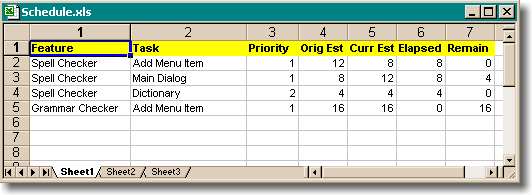Monthly ArchiveMay 2007
Decision Making 15 May 2007 11:47 am
Topic 5: Decision Making (a few last minute details)
Our next topic is decision making.
For those calling in, just as a reminder here are the details
9:45 am PT/11:45 am CT — 11:00 am PT/1:00 pm CT
888-757-2748
passcode 180 487
And don’t forget to download these two exhibits. Why they are exhibits for decision making will be revealed tomorrow.
Decision Making 10 May 2007 10:27 am
Topic 5: Decision Making (Prisoner’s Dilemma)
What a great way to think about decision making. What a great way to think about being prisoner without actually having to be one.
There are many aspects of decision making, but one important one has to do with “predicting” what others will do. If I decide to do this, how will this person or that person respond (or the “market” react)? If I decide to take up hang gliding, how will my spouse take it?
This dilemma is a good way to think about “predicting” as part of the decision-making process. Of course part of that is, what happens if I do not predict well? How do I take that into account?
We will be talking about this next Wednesday. In the mean time, try to stay out of the slammer (or at least “decide” not to have an acccomplice).
Decision Making 07 May 2007 01:43 pm
Topic 5: Making Decisions (Lemons)
This is a very nice article from a Nobel Prize winning economist, George A. Akerlof
Now, don’t let that scare you away.
It is all about “lemons”, you know, like used cars. How do we make decisions when we are buying something that may have “uncertain” quality or value? If you have a really, really good car, do you think you can sell it for its real value, or will buyers be suspicious?
This is a great way to start thinking about making decisions (or not, I can’t decide…).
Decision Making 07 May 2007 09:38 am
Topic 5: Decision Making (Some Reading Material)
It is always good to start out with some good reading. I think you will find this series from the Harvard Business Review very helpful: Why Bad Decisions Happen to Good Managers
Just in case you think these articles have to take a long time to read and digest–I suggest that just skimming them for the basic ideas will be very helpful.
Back with more soon. Looking forward to our meeting, Wednesday, May 16.
We will start off with Bill Caldwell’s excellent briefing on employee performance evaluations.
Managing a Project 03 May 2007 01:12 pm
Topic 4: Managing a Project (summary)
Here’s the outline we used for Managing a Project. This covers all the questions and discussions we had (and even has an anecdote at the end).
As you could tell, the point of the session was not to explore the formal aspects of project management (other than the triangle: Scope, Cost and Time), but to explore the issues that affect our ability in general to management projects. There are plenty of good materials on the actual process–although the key to most of them is to KEEP IT SIMPLE and not get caught up in the mechanics of the proces–that is one of Joel Spolsky’s points in his materials.
- How we think about projects
- How we decide which projects to work on, and in what order
- How we negotiate with each other about what the scope really is
I also wanted to emphasize the difference between a project and a process.
- We need to focus more on our process for managing projects, including how much of it we can standardize the process without standardizing the final CMS the client sees. (that is, Standardize on the Process, Customize on the Client)
- We struggle with our projects as much because of the process as with our ability to manage projects
- We disrupt ourselves because we do not have a process.
- If we want to improve, we need to pay attention to our own behavior
Examining Our own behavior
- We need to understand how we are using our time
- Not just report time, but track time and understand time
- Compare the time we actually use to the time we thought we would need
- how good were we at estimating time
- how should we be allocating our people so that we have “enough time”
- Remember Joel Spolsky’s simple chart
- Understand how much we are spending on each project so that we can decide whether we are spending time on the right projects
- Understand how we choose which projects to work on, and establish a more rational process for making those choices

To the extent that we have a standard CMS implementation project plan (and can educate our clients about that plan and process) the more we can streamline our own work.
Still, we need to learn better to control the process of settling on the “Scope” of the project if we are going to have any control over the project.
- We need a process for developing a consensus within FNC regarding the scope
- We need a process for settling on a reasonably predictable scope of work with our clients that we can all generally live with (understanding that the process of development often reveals places where the scope should be changed).
The final mantras are:
- FOCUS
- ENERGY
- CLARITY
And don’t forget all of your negotiating skills, since those are the most important in establishing the scope and timing of any project.
GOOD LUCK.
